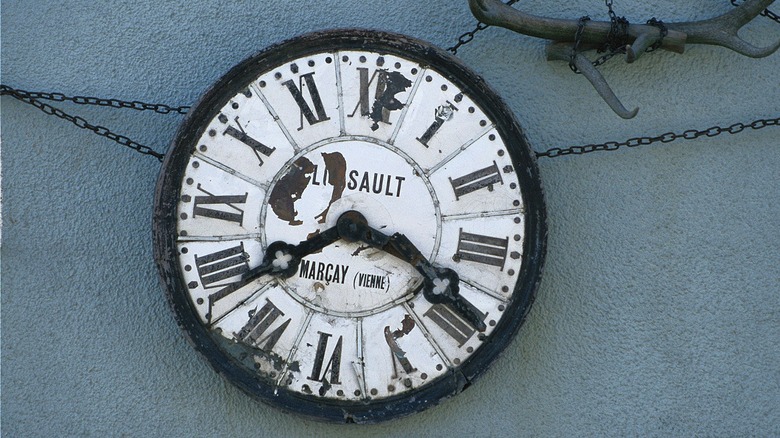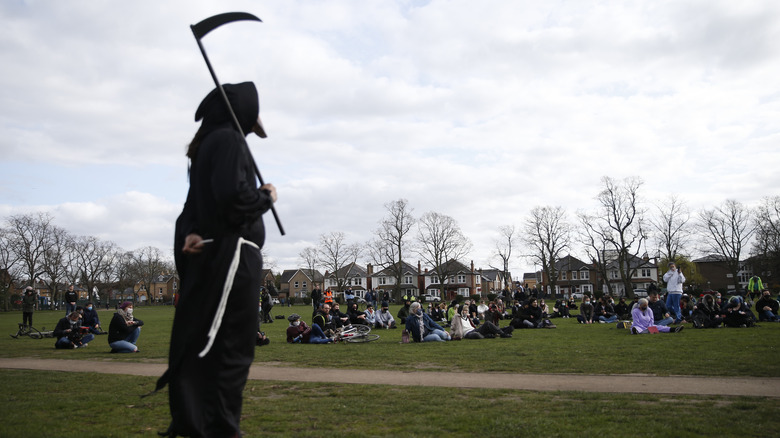Why Keeping Broken Clocks In Your Home Is Considered Unlucky
Keeping a broken clock in your home is considered by some to be unlucky, and various superstitions, popular beliefs, and even the art and science of feng shui say so. Per the principles of feng shui, any broken item or possession in the home is a sign of inner and external clutter, and a clock in disrepair should be fixed or gotten rid of to encourage positive Chi.
Generally speaking, in the West, a broken clock is a harbinger of imminent doom, and in Eastern thought, it portends bad luck, according to Desjardins Insurance. For example, based on Vastu shastra, the traditional Indian system of architecture and design, a clock hanging on the wall influences one's fate minute by minute (per the Dailyhunt). A broken clock in the home, then, might have a negative impact on the entire family and should to be dealt with immediately.
Symbol Sage, meanwhile, asserts that clocks are physical representations that one's time is finite: Each minute counts, and nothing lasts forever. A stopped clock disrupts those basic truths, and Symbolism & Metaphor associates a broken clock with moving backward, personal stagnancy, relationship issues, and anxiety. Simply seeing a broken clock in person or in dreams is considered to be unlucky.
Unlucky effects of clock breakdowns
Superstition accepts that one's future may be determined by seemingly unrelated things, according to New World Encyclopedia. There's an abundance of notions that make a connection between one's luck or fate and a watch or clock that stops working. A broken watch is said to impede a person's progress and invite bad luck and failure. In effect, a stopped clock stops time itself, and your personal life or work will grind to a halt like a clock that breaks, per superstition.
Furthermore, not fixing a broken watch or clock is ill-advised because it may result in someone else's demise. Some believe a watch or clock face that breaks indicates you're the target of a hex or bad vibes sent your way.
In popular thought, a clock's mechanism is interconnected with one's body. Unluckily, a malfunctioning watch or clock is therefore a hint of a possible illness or infirmity. Symbols & Synchronicity equates a ticking clock with a heartbeat, so a stopped clock equals death. A positive spin on a broken clock is that it may be a possible sign someone in the spiritual world is trying to defy time and space to communicate with you. Also, "a stopped clock is right twice a day."
History, broken clocks, and luck
Mechanical clocks originated in northern Italy and southern Germany in the late 13th century, per The Seiko Museum Ginza. Lacking dials or hands, these early clocks told time by striking bells. In fact, "clock" is derived from the French word "cloche," meaning bell. According to Coastal Towne Mortgage, associating a broken clock with bad luck originated sometime in the 19th century. Timepieces were normally long-lasting and of high quality. When a clock or watch stopped working it precipitated out-of-the-ordinary explanations.
Historical links between a broken clock and death are cited by Hypnogoria. Noisy clocks were temporarily stopped to permit silent grieving and remained so until the deceased was removed from the premises. Clocks were also stopped — and symbolically, time too — so death would not make a return appearance.
Winding hands backward on a broken clock is thought to be unlucky, too, according to The Case Farm. In the old days, artisans adjusting the time backward tended to put the chimes out of sync, leading to this superstition: To sidestep bad luck, rather than setting a clock back by 15 minutes, for example, it's wise to forward it instead by 11 hours and 45 minutes.


